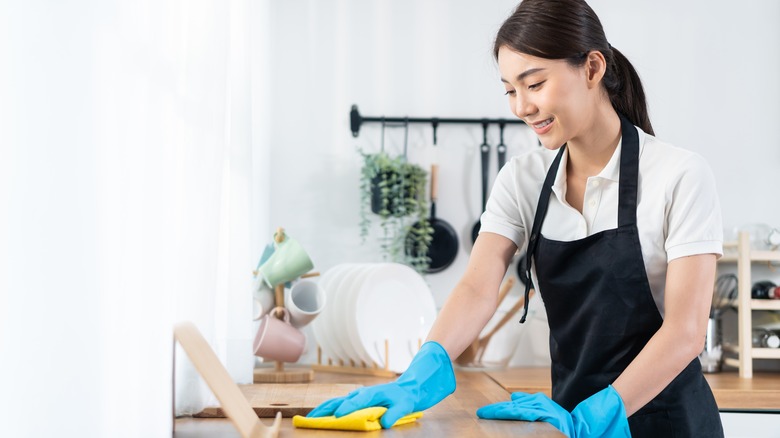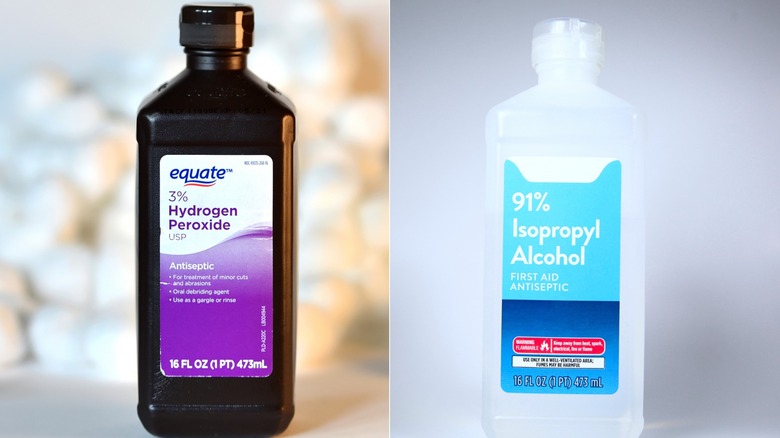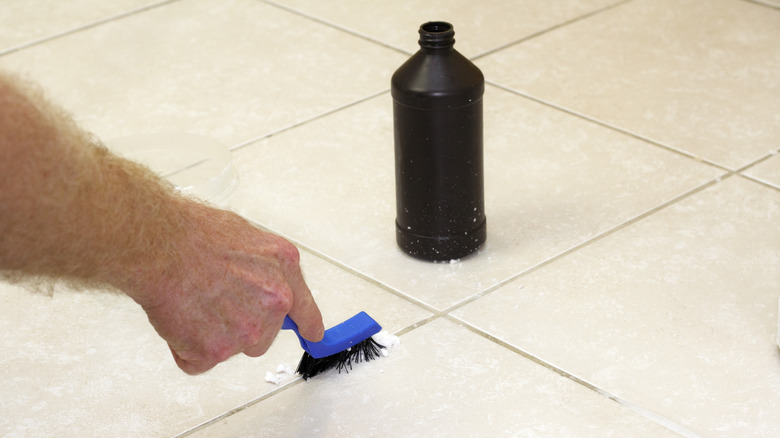Does Mixing Hydrogen Peroxide And Rubbing Alcohol Offer A More Powerful Clean?
Mixing chemical cleaners together is typically unsafe. For example, combining rubbing alcohol and bleach creates chloroform – if exposed to this chemical, it can cause adverse health effects including damage to your nervous system. Additionally, mixing vinegar with hydrogen peroxide forms peracetic acid, which is corrosive and could damage your respiratory system, eyes, and skin. Because of this, mixing your cleaners together typically isn't a good idea, and that is still the case with rubbing alcohol and hydrogen peroxide. Combining these two common household cleaners likely won't cause any harm, but it probably won't create a stronger cleaning solution either, though there are mixed opinions.
While there's no evidence that combining these solutions is beneficial, both isopropyl alcohol and hydrogen peroxide are effective for disinfecting a variety of surfaces when used on their own. For example, if you're dealing with mold, hydrogen peroxide will probably be more helpful, while alcohol can kill some common viruses very quickly. Though mixing rubbing alcohol and hydrogen peroxide likely won't make a super cleaner, you can use them separately to keep your home clean.
Why you probably shouldn't mix rubbing alcohol and hydrogen peroxide
Some online sources suggest mixing isopropyl alcohol and hydrogen peroxide, along with other ingredients, to make a spray sanitizer or hand sanitizer. However, according to WebMD, the hydrogen peroxide is useful when making a sanitizer not because it makes the mixture more effective but because it will kill any bacteria that could enter the bottle or product while you're making it. Overall, there are no studies that prove that mixing these two cleaners will make an extra-effective product. Further, some believe that allowing this mixture to sit for a while could create a different chemical compound that's less effective when cleaning.
Hydrogen peroxide and rubbing alcohol can eliminate different microorganisms, so cleaning with them separately rather than trying to mix your own solution is typically best. For example, rubbing alcohol is not sporicidal, which is why it's not the best choice for cleaning mold compared to hydrogen peroxide. If you clean a moldy area with hydrogen peroxide, it should take care of the spores as well as any bacteria or germs on the surface, leaving no need to add another product into the mix. Further, while both cleaners will tackle viruses and bacteria, hydrogen peroxide will take at least 15 minutes to work, while rubbing alcohol can be effective in a matter of seconds. Therefore, if you need to clean something quickly, rubbing alcohol may be the better solution.
Cleaning with hydrogen peroxide and rubbing alcohol separately
Hydrogen peroxide is often utilized when cleaning because it is not only a disinfectant and antimicrobial, but can also be effective against stains. While the solution is safe to use on most surfaces including grout, fabrics, tile, and carpet, it's best to wear gloves to protect your skin and test a small area first to ensure it won't discolor the object you're cleaning. You can mix hydrogen peroxide with baking soda to create an efficient cleaning paste that can fight mold, or you can combine equal parts of the cleaner with water to make a disinfecting spray for use all over the house. The peroxide may need to sit on the surface for 15 minutes for it to be as effective as possible.
To sanitize your home fast, rubbing alcohol is a great option. When cleaning with alcohol, make sure the room is well-ventilated and don't put it near any sources of heat, as it's extremely flammable. Both rubbing alcohol and hydrogen peroxide can also be used on countertops, porcelain, stainless steel, glass, and more. Within seconds, isopropyl alcohol can eliminate bacteria like E. coli and S. aureus, allowing you to quickly clean high touch surfaces in your home. Simply wipe it over the surface and allow it to evaporate. Make sure you use enough alcohol to keep your surface damp for approximately 30 seconds so that it has time to eliminate harmful viruses.


